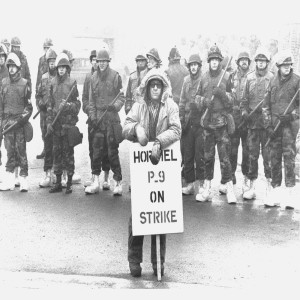

On this day in Labor History the year was 1985.
That was the day that workers at the Hormel plant in Austin, Minnesota went out on strike.
They were members of the United Food and Commercial Workers Union Local P-9.
Hormel had slashed workers’ wages by twenty-three percent during the early 1980s.
Benefits were also diminished and incentive programs rolled back.
These changes cut deeply into the Hormel workers’ earnings.
What had been considered a good job was changing drastically.
This was the story for many workers in Regan-Era America.
The 3,500 Hormel workers voted overwhelmingly to strike.
The national UFCW discouraged the action.
The strike lasted more than a year.
Strikebreakers were brought in, including some of the union members who crossed the picket line to return to work.
The National Guard was called in to keep the peace between strikers and scabs.
After a year, the strike went down in defeat.
Even after the strike, many were not called back to work.
They were put on waiting lists for a job to reopen.
Some never returned to the plant.
Twenty-five years after the strike the Austin Daily Herald staff wrote, “What resulted was a bitter, drawn-out labor dispute that drastically impacted the community, from workers who lost jobs to families that were torn apart by picket lines.”
The strike became the feature of a documentary by Barbara Kopple.
In 1990 the documentary, “American Dream” won the Academy Award. The
film tells the story of the Hormel strike as a window into the tragic experiences of many workers in during the 1980s.
The film was made on a shoestring budget.
Singer Bruce Springsteen provided $25,000 to help support this important film
More Episodes
All Episodes>>You may also like
Create Your Podcast In Minutes
- Full-featured podcast site
- Unlimited storage and bandwidth
- Comprehensive podcast stats
- Distribute to Apple Podcasts, Spotify, and more
- Make money with your podcast











